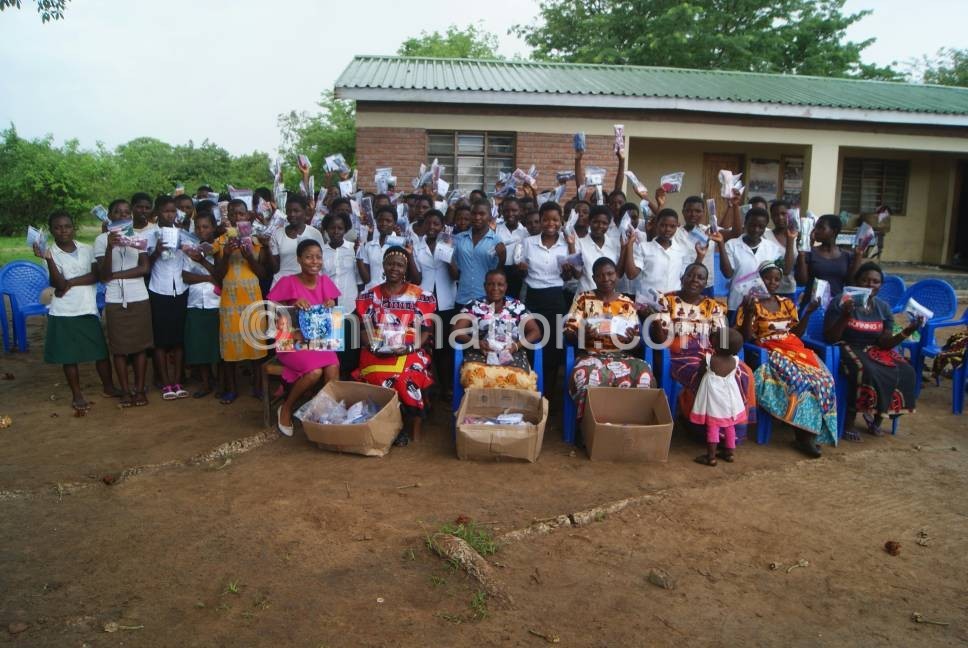Menstruating with dignity

In Africa, women and girls aged 10 to 50 constitute 30 percent of
the population—or are 357 million in total.
Females make up most of Malawi’s population at 52% but remain
one of the most marginalised segment of the population, alongside
children.
Women for example, due to a number of reasons, do not
menstruate with dignity. They are forced to survive on unconventional
ways of taking care of themselves.
A woman menstruates an average of five days in a 28-day
cycle, which translates into a total of 60 days in a year. During these
five days, women need to have sanitary products and quality health care
to manage their menstrual period.
Unfortunately, in most rural parts of Malawi, girls miss out
on that luxury due to high poverty levels and absence of deliberate
policies promoting access to standard and affordable sanitary pads.
In most rural areas, students miss out classes when it’s that
time of the month. The number of days ‘lost’, has a significant effect
on a girl-child’s academic performance.
The few that make it to school mostly use pieces of cloth
locally known as Nyanda or, in extreme cases, muffled banana stalk
barks, as makeshift pads.
15-year-old Grace (not real name) is one of the many girls at
Mtakataka Roman Catholic Primary school who was facing challenges with managing
her menstrual cycle with dignity and in comfort, without missing classes
and jeopardising her ability to actualise her academic
potential.
“Whenever I or most of my friends were menstruating, it
was difficult to attend classes because we did not have sanitary
products. Using a piece of cloth is just not comfortable when you are in
class,” explained Grace.
Ironically, menstrual health management is directly linked to
women empowerment and the fulfilment of human rights, specifically sexual
and reproductive health and rights (SRHR), for women and girls.
But in Malawi just like the rest of Africa, challenges like
inequalities in SRHR already deprive millions of girls and women, undermining
efforts to achieve the Sustainable Development Goals
(SDGs), among other developmental tools.
“Malawi cannot develop if certain populations continue
to be ignored.
In this case, females and yet they make up the majority of the
people,” explained Grace.
Grace’s story has changed as she is among 900 girls from TA
Kachindamoto’s area who have received a timely intervention of reusable
sanitary pads courtesy of Days for Girls—a non-profit
organisation empowering women and girls by providing them with
sustainable feminine hygiene and health education.
Each girl received two reusable pads which cost K2000
(2.75USD), and that was all that was needed to break the chains of
period shame.
“I am happy I received the pads and they will go a long
way in ensuring that I remain in class even when menstruating,” remarked
Grace.
While the cost appears affordable, it is not to poor
Malawians like Grace. She concurred with India’s trending film, Padman,
modelled on a grassroots innovator of sanitary towels in questioning the
high price tag.
“Why should the price of something so light be so
heavy,” the protagonist asked in one of the scenes.
Even Grace, a standard six pupil cannot fathom why sanitary
pads are so expensive.
“For girls in town, maybe they understand why pads are
expensive but for me, no. I wish it was possible to give out free
sanitary products to women in Malawi, especially students. That will
increase the country’s literacy levels, therefore, improve on human
development,” she said.
The washable sanitary pads are made out of flannel cloth and
waterproof material and can be used for three years according to Days for
Girls.
“Research shows that most girls miss out on classes due
to lack the proper menstruation management. We came up with sustainable
and environmentally friendly ways of solving the problem. Days for Girls
cultivates social enterprises where women handmade these washable
pads. We distribute to schools, orphanages, health centres
and some are also sold.
“Again, we organised the event in the area to complement
the chief’s efforts to bring girls back to school by providing these
washable pads,” said Beria Michembo, Days for Girls Malawi
administrator.
Similar efforts are being replicated by different
organisations across Malawi. Though much needs to be done to reach out
to as many beneficiaries as possible, reusable sanitary pads are not only
restoring smiles on the face of girls who used to struggle due to the call
of nature.
They are empowering the girls, building their self-esteem, as
well as according them dignity while menstruating.





